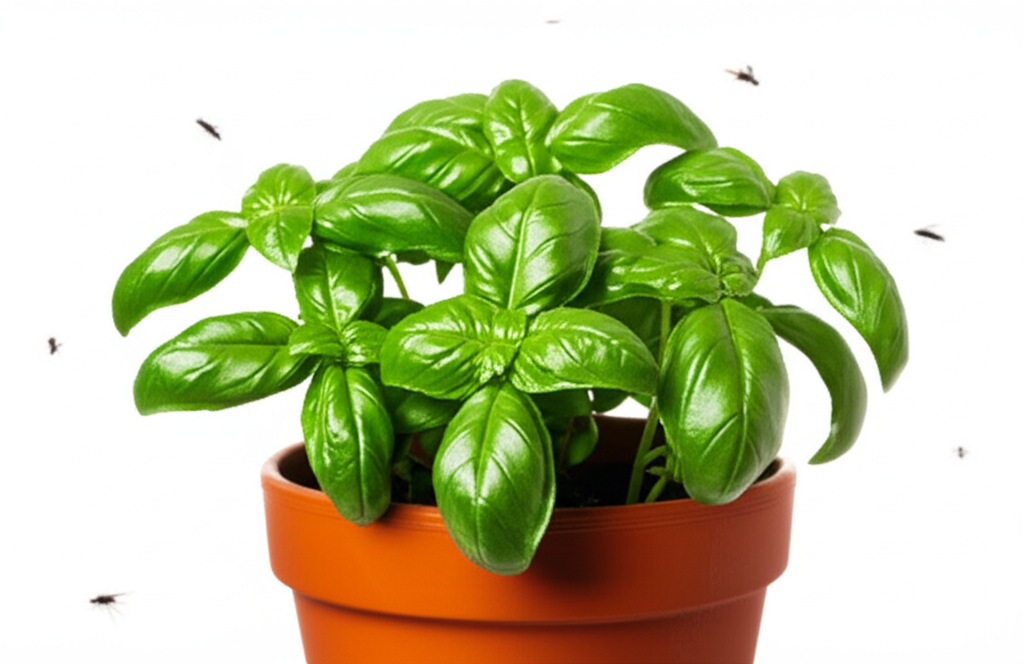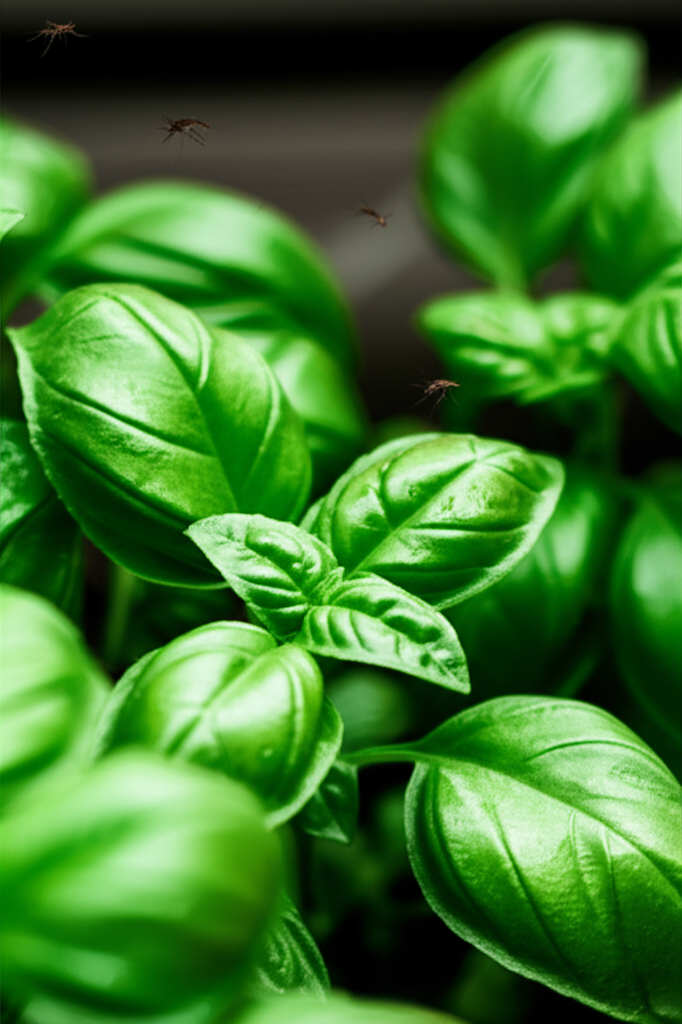Basil Plant Mosquito Repellent: Effortless Defense Against Pesky Invaders

Are you tired of swatting away mosquitoes every time you step into your garden or onto your patio? Do you dream of enjoying warm evenings outdoors without the constant buzz and itchy bites? If so, you might be wondering: can a basil plant really act as a mosquito repellent, and how can you harness its natural power for effortless defense? Understanding the science behind plant-based pest control is crucial for creating a healthier, more enjoyable outdoor space, and the humble basil plant might just be your secret weapon. Harnessing the power of nature to deter these common nuisances not only enhances your garden’s tranquility but also promotes a more sustainable and chemical-free approach to pest management, benefiting both your family and the wider ecosystem.
Quick Answer Box
Yes, a basil plant can act as a natural mosquito repellent. The essential oils within basil leaves, particularly eugenol, limonene, and citronellal, emit a scent that mosquitoes find unpleasant and actively avoid. Planting basil in your garden or near outdoor seating areas can help create a less inviting environment for these biting insects.
What is Basil Plant Mosquito Repellent and Why It’s Important in Gardening
“Basil plant mosquito repellent” refers to the practice of utilizing basil plants (Ocimum basilicum) and their natural properties to deter mosquitoes from an area. It’s a form of botanical pest control, leveraging the aromatic compounds produced by the plant to create a scent barrier that mosquitoes find unappealing. This is important in gardening for several reasons:
Health and Well-being: Mosquitoes are not just a nuisance; they can transmit serious diseases like West Nile virus, Zika virus, and malaria. By using natural repellents, you can reduce your exposure to these risks without resorting to harsh chemical sprays that can harm beneficial insects, pets, and even human health.
Sustainable Gardening Practices: Embracing plant-based solutions aligns with the principles of sustainable and organic gardening. It reduces reliance on synthetic pesticides, which can pollute water sources, harm wildlife, and disrupt natural ecosystems.
Enhanced Outdoor Enjoyment: A garden is meant to be a sanctuary. Effective, natural mosquito control allows you to fully enjoy your outdoor living spaces – dining al fresco, reading a book, or simply relaxing – without the constant annoyance of mosquitoes.
Biodiversity Support: Many commercial mosquito repellents kill insects indiscriminately, including beneficial pollinators like bees and butterflies. Basil, on the other hand, targets specific pests without harming the broader insect population essential for a healthy garden ecosystem.
Quick Recommendations or Key Insights about Basil Plant Mosquito Repellent
Plant it Strategically: Place basil pots or beds near windows, doors, patios, and seating areas.
Choose Aromatic Varieties: Some basil varieties, like lemon basil and cinnamon basil, are known for their stronger scents.
Don’t Just Plant, Engage: Crush or bruise basil leaves to release more of their scent.
Consider Companion Planting: Integrate basil with other mosquito-repelling plants for a synergistic effect.
It’s a Deterrent, Not a Force Field: Basil is most effective in conjunction with other mosquito control methods.
Detailed Breakdown of Basil Plant Mosquito Repellent
The Science Behind Basil’s Repellent Power
Basil’s ability to repel mosquitoes lies in its essential oils. These are volatile organic compounds that the plant produces for various purposes, including defense against pests and attracting pollinators. Several key compounds within basil’s essential oil profile are particularly effective against mosquitoes:
Eugenol: This compound, also found in cloves, is a well-known insect repellent. It disrupts mosquito olfactory receptors, making it difficult for them to locate hosts.
Limonene: Found in citrus peels, limonene has a strong, pleasant scent to humans but is repellent to many insects, including mosquitoes.
Citronellal: This is a primary component of citronella oil, a widely recognized natural mosquito repellent. Citronellal masks the human scent cues that attract mosquitoes.
Linalool: Known for its floral scent, linalool also exhibits insecticidal and repellent properties.
When mosquitoes encounter the scent of these compounds released from basil leaves, they are discouraged from landing or feeding in that vicinity. The concentration and effectiveness can vary depending on the basil variety, growing conditions, and how the leaves are handled.
Practical Applications in the Garden
Integrating basil for mosquito control is straightforward and can be a beautiful addition to your landscape:
Container Gardening: Plant basil in pots and place them strategically around your patio, deck, or near entryways. This allows you to control the basil’s location and maximize its repellent effect where you spend the most time outdoors.
In-Ground Planting: Dedicate a section of your garden border or integrate basil plants among your ornamental flowers or vegetable beds. This provides a broader area of protection and enhances the visual appeal of your garden.
Herb Gardens: Basil is a staple in many herb gardens, so its inclusion for pest control is a natural fit. It pairs well with other culinary herbs and can contribute to a multi-sensory garden experience.
Hanging Baskets: Hanging baskets filled with basil can be suspended from pergolas, porches, or eaves, providing a fragrant deterrent at a higher level, potentially reaching more open-air spaces.
Common Mistakes to Avoid
While basil is a fantastic natural repellent, it’s not a magic bullet. Here are common mistakes gardeners make:
Underestimating the Quantity Needed: A single basil plant might offer minimal protection for a large area. You need to plant basil generously and strategically to create a noticeable repellent effect.
Forgetting to Engage the Leaves: Basil plants left untouched won’t release as much scent. Regularly brushing against the leaves, lightly crushing them, or even harvesting them will release more of the aromatic oils.
Expecting Complete Eradication: Basil is a deterrent. It will make an area less attractive to mosquitoes, but it won’t eliminate them entirely, especially in heavily infested areas or during peak mosquito activity.
Neglecting Other Mosquito Control Methods: For comprehensive protection, combine basil with other strategies like eliminating standing water (breeding grounds), using fans, or employing other natural repellents.
Overwatering or Poor Drainage: Basil, while preferring moist soil, can suffer from root rot if overwatered or planted in poorly draining soil. Healthy plants produce more potent essential oils.
Expert Tips or Pro Insights
Crush and Carry: Keep a small pot of basil on your windowsill or near your outdoor seating. Gently crush a few leaves before sitting outside to release a burst of repellent scent.
Harvest Regularly: Frequent harvesting encourages bushier growth and more leaf surface area, leading to greater scent production. Consider drying excess basil for use in cooking or potpourri, which can also release some of its aromatic compounds.
Companion Planting Synergy: Pair basil with other known mosquito-repelling plants like rosemary, lavender, marigolds, catnip, and citronella grass. This creates a more robust natural defense system.
Lemon Basil for Extra Punch: Varieties like ‘Lemon Basil’ or ‘Lime Basil’ often have a stronger citrusy aroma due to higher concentrations of limonene, potentially increasing their repellent efficacy.
Infuse Oils: For a more concentrated topical repellent, you can infuse basil leaves in a carrier oil (like olive or almond oil) and apply it to your skin. However, always perform a patch test first.
Seasonal or Climate Considerations
Basil thrives in warm, sunny conditions, making it an ideal companion for summer mosquito control.
Spring: Start basil seeds indoors or plant seedlings after the last frost. As temperatures rise, the plant’s scent production will increase.
Summer: This is peak season for both basil growth and mosquito activity. Maximize your basil planting and regularly engage the leaves for the best results. In very hot, dry climates, ensure basil receives adequate water and possibly some afternoon shade to prevent wilting.
Autumn: As temperatures cool and frost approaches, basil plants will begin to decline. Harvest any remaining basil before the first frost. Its repellent effect will diminish with cooler weather.
Climate Zones: Basil is typically grown as an annual in most temperate climates. In tropical or subtropical regions, it can be grown as a perennial. Its effectiveness as a repellent is directly tied to its active growth and warm temperatures.
Buying Guide or Decision-Making Process
When choosing basil for mosquito repellent purposes, consider these factors:
Variety: While most basil varieties offer some repellent properties, consider those known for stronger scents:
Lemon Basil (Ocimum x citriodorum): Strong citrusy aroma.
Cinnamon Basil (Ocimum basilicum ‘Cinnamon’): Sweet, spicy scent.
Thai Basil (Ocimum basilicum var. thyrsiflora): Anise-like scent.
Genovese Basil (Ocimum basilicum): Classic, robust basil flavor and aroma, still effective.
Plant Source:
Seeds: A cost-effective option, allowing you to grow from scratch. Look for reputable seed suppliers.
Seedlings/Starts: Available at garden centers and nurseries. Choose healthy, vibrant plants with no signs of pests or disease.
Potting Mix: Use a good quality, well-draining potting mix for container-grown basil. For in-ground planting, amend the soil with compost to improve fertility and drainage.
* Containers: If planting in pots, choose containers with drainage holes. Terracotta pots can help wick away excess moisture, while plastic pots retain moisture better. Size matters; larger pots allow for more robust root growth and healthier plants.
FAQ Section for Basil Plant Mosquito Repellent
Q1: How many basil plants do I need to repel mosquitoes?
A: There’s no exact number, as it depends on the size of your area and mosquito population. For effective deterrence around a patio, aim for several pots or a dedicated planting area of at least a few square feet.
Q2: Can I rub basil leaves directly on my skin as a mosquito repellent?
A: Yes, you can gently rub fresh basil leaves on your skin. However, the effect is temporary. For a more lasting topical repellent, consider infusing the leaves in a carrier oil. Always do a patch test for skin sensitivity.
Q3: Does dried basil still repel mosquitoes?
A: Dried basil retains some of its aromatic compounds, but the scent is generally less potent than fresh leaves. Crushing dried leaves can release more fragrance.
Q4: Will basil kill mosquitoes?
A: Basil primarily acts as a deterrent. Its scent discourages mosquitoes from entering the area, but it is unlikely to kill them outright.
Q5: Can I use basil essential oil to repel mosquitoes?
A: Yes, basil essential oil can be used, but it must be diluted in a carrier oil (like coconut or jojoba oil) before topical application. A common dilution is 1-2% essential oil to carrier oil. Never apply undiluted essential oils to the skin.
Q6: How do I keep my basil plants healthy for maximum repellent effect?
A: Provide basil with at least 6-8 hours of sunlight daily, consistently moist (but not waterlogged) soil, and good air circulation. Regular harvesting also encourages healthier growth.
Conclusion for Basil Plant Mosquito Repellent
Harnessing the natural power of the basil plant mosquito repellent is a simple, aromatic, and effective strategy for creating a more enjoyable outdoor environment. By understanding the science behind its essential oils and applying practical planting techniques, you can significantly reduce mosquito presence in your garden, patio, or balcony. Remember to plant generously, engage the leaves to release their potent scent, and combine this natural approach with other sustainable pest management methods for the best results. Embrace the beauty and fragrance of basil while enjoying a more peaceful, bite-free experience outdoors. Start planting your basil today and transform your garden into a sanctuary.


